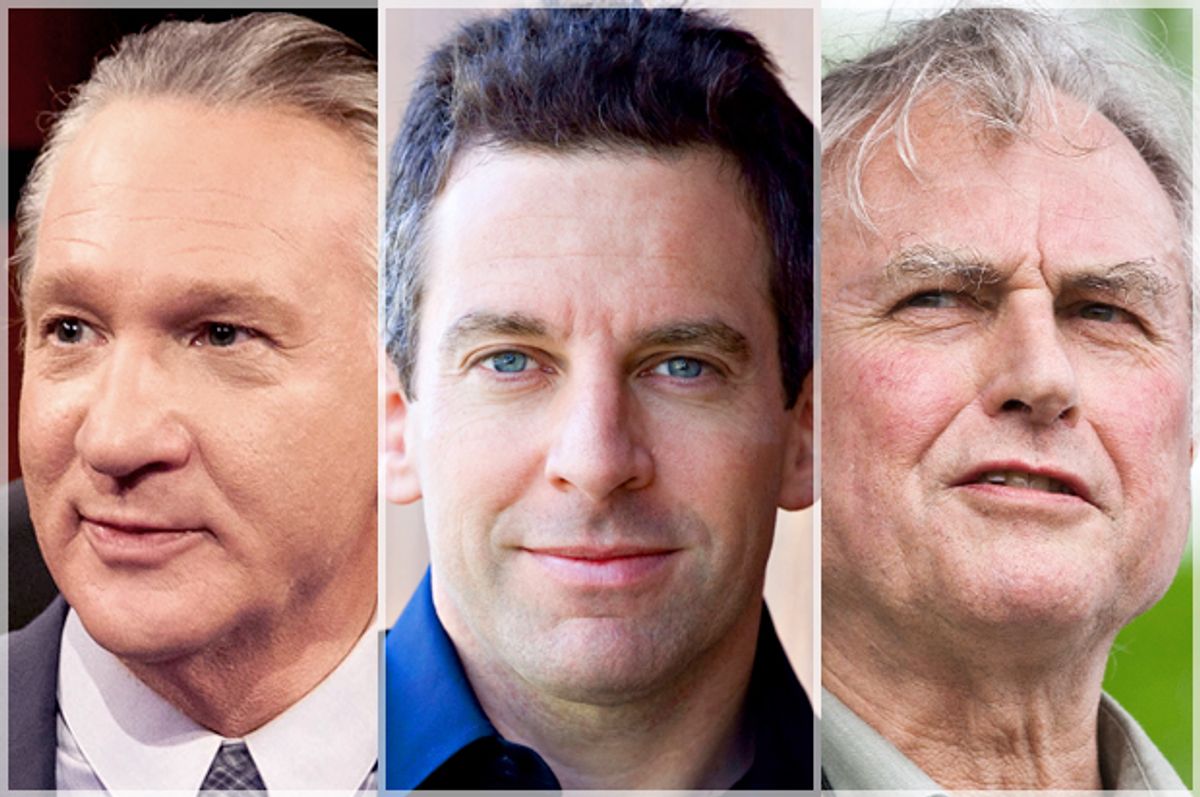Thanks to Ben Carson’s objectively stupid remarks about Islam and the U.S. Constitution, a conversation about religion, violence and xenophobia has been reignited. Noted atheist Sam Harris also weighed in on the topic last week (albeit from a completely different angle). Harris and his collaborator, Maajid Nawaz, argued in a piece for The Daily Beast that liberals have to talk honestly about “Islam’s Jihad problem,” without veering into Islamophobic territory.
Carson has been criticized mercilessly in recent days, and for good reasons. The presidential hopeful, like many of his fellow travelers in the GOP, is a religious bigot. As a fundamentalist Christian, he can’t be dispassionately critical of other faiths. Virtually everything he says on the topic of religion is tinged with zealotry. Not so with Harris and Nawaz. Although Harris has been especially critical of Islam, he has spent as much (if not more) time condemning Christianity and faith in general. So Harris at least offers a less tribalistic perspective.
Now seems as good a time as any to draw a clear distinction between xenophobia (i.e. what you hear at a Donald Trump rally) and legitimate critiques of Islamic extremism. I don’t always agree with Harris, and I’ve been critical of the so-called “New Atheists,” but he’s absolutely right that we have to be able to criticize specific religious ideas without being accused of bigotry. A religion, after all, is not a race, and so criticizing a faith tradition is not the same thing as criticizing, say, an ethnic group.
A religion is a bundle of ideas, some better than others. I happen to think that all religions are equally mistaken about the nature of the universe. But all religions are not the same. Harris’s point is that Islam, at this particular moment and for a variety of reasons, has a unique problem, and that we (particularly liberals) need to have an “honest conversation” about that. Harris writes:
What most discussions of Muslim extremism miss, and what is obfuscated at every turn by commentators like Glenn Greenwald, Reza Aslan, Karen Armstrong – and even Nicholas Kristof and Ben Affleck – is the power of specific religious ideas such as martyrdom, apostasy, blasphemy, prophecy, and honor. These ideas do not represent the totality of Islam, but neither are they foreign to it. Nor do they exist in precisely the same way in other faiths. There is a reason why no one is losing sleep over the threat posed by Jain and Quaker extremists. Specific doctrines matter.
Critics of Harris, Reza Aslan in particular, discount the role of specific religious doctrines. A religion, Aslan argues, doesn’t promote peace or violence – people do. There’s something fundamentally true about that (and I’m not sure Harris really grapples with it), but it’s also true that ideas matter. Beliefs animate behavior. And ideas give intellectual cover for actions. I’m no authority on Islam or any other religion, but it’s intellectually dishonest to deny that a substantial number of Muslims (obviously a tiny minority of the 1.5 billion Muslims across the world) literally believe in the metaphysics of martyrdom and in violent Jihad. To the extent that that’s true, it matters a great deal.
I understand the instinct to reject blanket criticisms of Islam and Muslims – it’s essential that we guard against that. But we can’t reflexively reject critiques of specific ideas within Islam, ideas that are operative in several regions of the world today.
Muslims, on the whole, are as good or bad as Christians or anyone else. And the Bible, especially the Old Testament, is every bit as immoral and misogynistic (perhaps more so) as any other religious text. If there’s a difference today, it’s that fewer Christians take the Bible (certain parts, at least) seriously. There are exceptions, however, and they’re equally susceptible to criticism. When a Christian bombs an abortion clinic on account of his literalist reading of the Bible, we should (and normally do) take him seriously. Likewise, when extremist Christians block stem cell research or discriminate against gay people, they do so for explicitly religious reasons – these are the practical consequences of belief in bad ideas. The same logic applies to any other religiously-motivated action in any other context.
One of the more salient points that people like Harris and Bill Maher (who is similarly heavy-handed in his approach to religion) make is that fundamentalist Islam, like fundamentalist Christianity, is a genuine threat to liberal values. But many liberals find it much easier to criticize Christianity than Islam – and that’s a problem. More importantly, it’s Muslims, particularly liberal Muslims, who suffer the most under theocratic regimes and religious terrorism. “Combating the ideology of Islamism,” Harris writes, “is the only way that non-Muslims can help those liberal Muslims who wish to reform their faith from within. And failing to do so means abandoning the most vulnerable in Muslim communities – women, gays, apostates, freethinkers, and intellectuals.” Whatever else Harris is wrong about, he makes a valid point here, one that liberals should take seriously.
It can’t be said enough that a group like ISIS doesn’t represent true Islam – I don’t think any manifestation of any faith represents the one true form. And it’s also true that the overwhelming number of Muslims in the world want what everyone else does: peace, freedom, and security for their families. The 7th-century version of Islam that ISIS pines for does not represent the global Muslim community in any way – no one should be confused about that.
There are many explanations for the phenomenon of Islamic terrorism; it’s an enormously complicated problem, which is why nuance is necessary. Critics of Harris are right to emphasize that politics, history, economics, Western imperialism, and institutional corruption all matter – these variables are as significant as any other. But ideas matter, too. And it’s critical that we find a way to criticize these ideas (no matter how distorted they are) without condemning an entire community or delegitimizing the social and political factors.

Shares